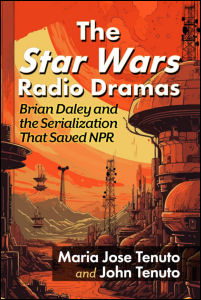 McFarland publishes the non-fiction book The Star Wars Radio Dramas: Brian Daley and the Serialization That Saved NPR by Maria Jose Tenuto and John Tenuto, briefly tracing the history of public radio in the United States and then focusing on the outsized role that NPR’s 1980s Star Wars radio dramas played in helping to establish a firmer financial footing for the network.
McFarland publishes the non-fiction book The Star Wars Radio Dramas: Brian Daley and the Serialization That Saved NPR by Maria Jose Tenuto and John Tenuto, briefly tracing the history of public radio in the United States and then focusing on the outsized role that NPR’s 1980s Star Wars radio dramas played in helping to establish a firmer financial footing for the network. ![]()
 Story: Created by Congressional legislation in 1970, National Public Radio found itself almost immediately competing for funding with TV’s Public Broadcasting Service, which was initiated by the same legislation. A fortuitous convergence of talent within NPR’s California hub of operations at the University of Southern California, looking for something that would be attention-getting enough to drive listener donations, met with a sympathetic ear in famous USC alumnus George Lucas, who was two movies into the creation of a certain science fiction franchise called Star Wars. Lucas sold the radio adaptation rights to NPR for a mere dollar; a similar (if not quite as unimaginably cheap) deal was struck for John Williams’ iconic soundtrack music, and members of the movies’ cast showed an interest in participating. Now the major task became finding a writer capable of translating the most visually-oriented movie in history to a purely auditory medium.
Story: Created by Congressional legislation in 1970, National Public Radio found itself almost immediately competing for funding with TV’s Public Broadcasting Service, which was initiated by the same legislation. A fortuitous convergence of talent within NPR’s California hub of operations at the University of Southern California, looking for something that would be attention-getting enough to drive listener donations, met with a sympathetic ear in famous USC alumnus George Lucas, who was two movies into the creation of a certain science fiction franchise called Star Wars. Lucas sold the radio adaptation rights to NPR for a mere dollar; a similar (if not quite as unimaginably cheap) deal was struck for John Williams’ iconic soundtrack music, and members of the movies’ cast showed an interest in participating. Now the major task became finding a writer capable of translating the most visually-oriented movie in history to a purely auditory medium.
Review: The further we get into the era of Star Wars as a hotbed of streaming series, the further in the rear-view mirror go those elements of the fandom that were all you had in real time before the movies hit television or videotape: the unlikely Marvel Comics series chronicling the gang’s run-ins with such characters as Valance and Jaxxon, the poster magazines whose essays filled out the background of the universe, the original waves of toys, and National Public Radio’s better-than-it-had-any-right-to-be audio adaptation of the first two movies. This book finally gives the radio dramas their due, and posthumously looks back at the writer who managed to satisfy everyone involved – on both NPR’s part and within Lucasfilm – that it could be done: Brian Daley.
Early parts of the book look in-depth at the formation and early funding struggles of NPR, a topic that’s worthy of its own book, and then catches us up on the career backgrounds of the renegade out-of-the-box thinkers who though adapting a special-effects-laden film to audio might actually work. The story then pauses a bit for an extensive biography of Daley, who died in 1996, filled out by remembrances and stories from colleagues, co-workers, and family members. Daley had already broken into the field of literary science fiction with his original prose, but his reliability, imagination and ambition quickly narrowed the field of potential Star Wars radio writers down to him and him alone. Reading this after reading A Disturbance In The Force is recommended, because with the long shadow cast – even then – by the Star Wars Holiday Special, of primary importance to Daley’s suitability for the job was how willing he was to play in the Star Wars sandbox by Lucasfilm’s rules.
Equally fascinating, though, are the missteps and side-steps taken in the run-up to Daley’s hire. The BBC, acknowledged as world leaders in the realm of radio drama, was expected to play a major role in the production of the Star Wars radio dramas, and the first writer put forth was someone whose work they already knew and trusted – except that this writer’s translation of the movie to audio didn’t sit well with Lucasfilm. A key interviewee throughout the book is Anthony Daniels, who reprised and expanded the role of C-3PO on radio, and became fast friends with Daley, who was amenable to the actor’s suggestions on writing Threepio “in character”. Daniels has gamely rolled out his best robot voice for movies, TV, and animation, but his memories of the radio dramas are among the happiest of his association with Star Wars as a franchise.
Another fascinating element highlighted particularly in the making of Star Wars and Empire for radio is the various participants’ comments on how the NPR adaptations would bring Star Wars to a segment of the population that couldn’t afford movie tickets and couldn’t afford the merch. All anyone had to do was turn on their radio, and they actually got more story than what was on film. Other fictional franchises would do well to take note of this.
The adaptation of the first movie is given primary importance; the stories behind the Empire radio adaptation are given a little less weight because, of course, the first movie’s adaptation was successful enough that of course NPR would continue. The drastically-curtailed 1990s adaptation of Return Of The Jedi, however, is given expanded coverage because of the unusual circumstances under which it came about, which sadly include the last days of Brian Daley, who again wrote the scripts for the radio adaptation but did not live to hear the completed project.
There’s a very bitter irony in finally sitting down to write a review of this book in a year when the Corporation for Public Broadcasting has been forced to shut down, leaving both NPR and PBS gasping for air (and funding) in its wake; you can’t say that Star Wars didn’t warn us all along that an evil empire’s gonna do what an evil empire’s gonna do, and it’s not as if the prequels (and let’s give credit to Andor where it’s due) didn’t lay out the playbook in detail. Even the sequels and the literary, televised, and animated backstory retroactively leading up to them warned us not to let our guard down against evils once thought vanquished. Once upon a time, everyone got to listen to Star Wars. But did anyone really listen?
Anyone with a fascination for radio Star Wars, and for the early days of the Star Wars fan experience when the original trilogy was still happening in real time, and neither the fates nor the adventures-between-movies of the characters were set in stone, should find this book engrossing.
Year: 2024
Authors: Maria Jose Tenuto, John Tenuto
Publisher: McFarland
Pages: 213 pages
Book review by Earl Green
